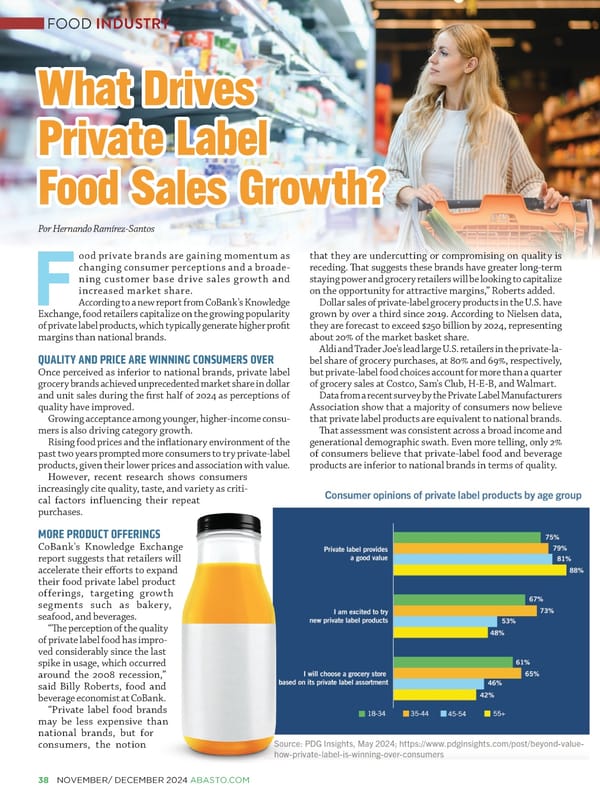FOOD INDUSTRY WWhhatat D Drriviveess PPrriivvaattee L Lababelel FFoooodd S Salealess G Grroowwtthh?? Por Hernando Ramírez-Santos ood private brands are gaining momentum as that they are undercutting or compromising on quality is changing consumer perceptions and a broade- receding. 吀栀at suggests these brands have greater long-term ning customer base drive sales growth and staying power and grocery retailers will be looking to capitalize increased market share. on the opportunity for attractive margins,” Roberts added. FAccording to a new report from CoBank's Knowledge Dollar sales of private-label grocery products in the U.S. have Exchange, food retailers capitalize on the growing popularity grown by over a third since 2019. According to Nielsen data, of private label products, which typically generate higher pro昀椀t they are forecast to exceed $250 billion by 2024, representing margins than national brands. about 20% of the market basket share. Aldi and Trader Joe's lead large U.S. retailers in the private-la- QUALITY AND PRICE ARE WINNING CONSUMERS OVER bel share of grocery purchases, at 80% and 69%, respectively, Once perceived as inferior to national brands, private label but private-label food choices account for more than a quarter grocery brands achieved unprecedented market share in dollar of grocery sales at Costco, Sam's Club, H-E-B, and Walmart. and unit sales during the 昀椀rst half of 2024 as perceptions of Data from a recent survey by the Private Label Manufacturers quality have improved. Association show that a majority of consumers now believe Growing acceptance among younger, higher-income consu- that private label products are equivalent to national brands. mers is also driving category growth. 吀栀at assessment was consistent across a broad income and Rising food prices and the in昀氀ationary environment of the generational demographic swath. Even more telling, only 2% past two years prompted more consumers to try private-label of consumers believe that private-label food and beverage products, given their lower prices and association with value. products are inferior to national brands in terms of quality. However, recent research shows consumers increasingly cite quality, taste, and variety as criti- cal factors influencing their repeat purchases. MORE PRODUCT OFFERINGS CoBank's Knowledge Exchange report suggests that retailers will accelerate their e昀昀orts to expand their food private label product offerings, targeting growth segments such as bakery, seafood, and beverages. “吀栀e perception of the quality of private label food has impro- ved considerably since the last spike in usage, which occurred around the 2008 recession,” said Billy Roberts, food and beverage economist at CoBank. “Private label food brands may be less expensive than national brands, but for consumers, the notion 3838 NNOOVVEEMMBBEERR/ D/ DECECEEMMBBEER 2R 200224 4 AABBAASSTOTO..CCOOMM
 Abasto Magazine: November/ December 2024 - ENGLISH Page 37 Page 39
Abasto Magazine: November/ December 2024 - ENGLISH Page 37 Page 39